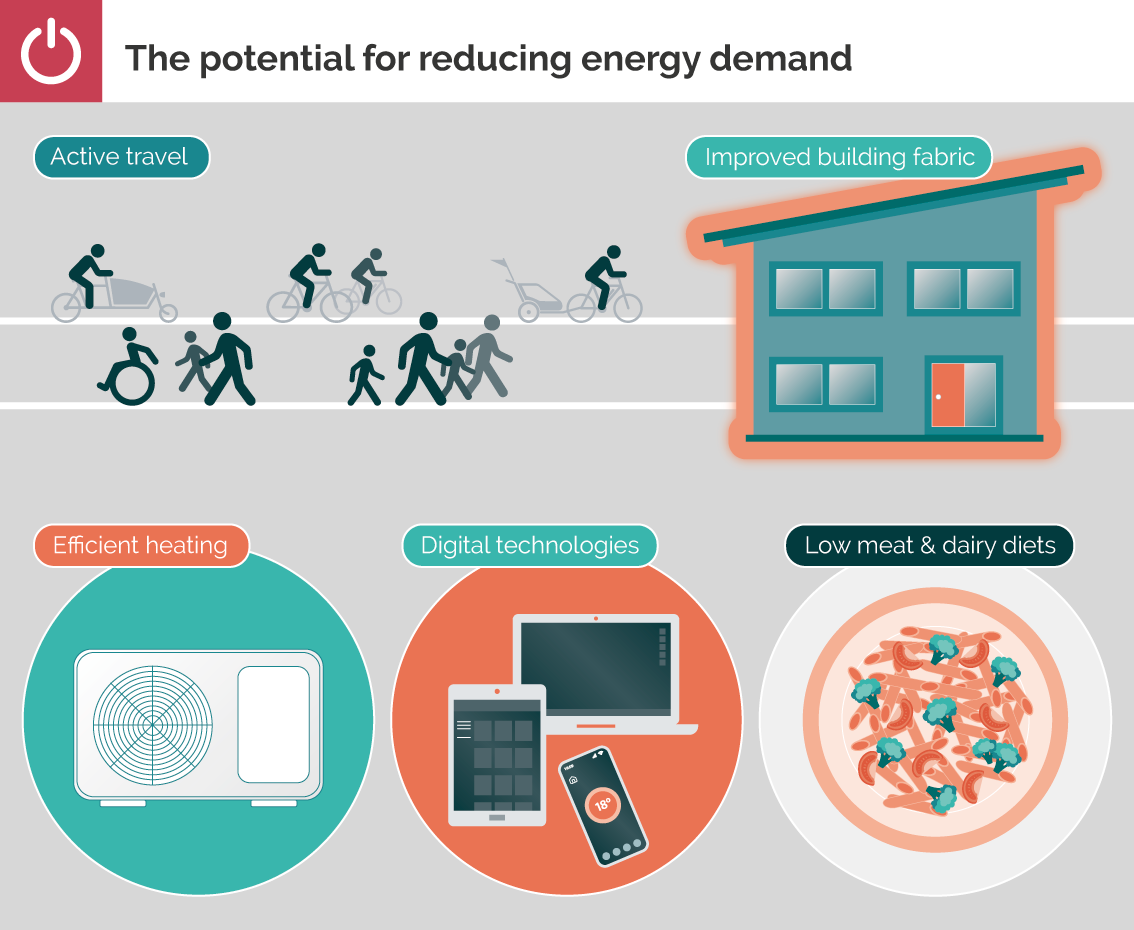
Reducing the UK’s overall energy demand should be at the heart of a fair, affordable and healthy route to net-zero carbon emissions. CREDS research suggests that UK final energy use could be halved by 2050, whilst improving energy security, enhancing quality of life, and reducing the risks and costs associated with carbon dioxide removal.
This would reduce UK per capita energy use from its current level of 89 GJ/year (2.8 kW) to 40 GJ/year (1.3 kW) [1], which is well below the current global average of 55 GJ/year (1.7 kW) and approximately one-third of the current OECD average [2]. This is consistent with subsequent Government analysis informed by CREDS methodology [3].
Techniques for improving energy efficiency are well-established. They have historically played the largest role in reducing UK emissions, although the rate of improvement has declined in the last decade, predominantly due to weaker policies [4].
The scale of the net-zero challenge now changes the agenda for research, practice and policy. The recent IPCC report shows that, to deliver a 1.5ºC temperature goal, global emissions will need to peak soon and fall by 43% by 2030, with faster declines in OECD countries. More fundamental changes in energy use will be required: to address the drivers of energy-using activities, to further improve efficiencies, to move to using zero-carbon energy sources, and to use energy with greater temporal flexibility [5].
Energy use is driven by the demand for energy services in other sectors and systems of provision – notably for mobility (transport), materials (industry), shelter and comfort (buildings) and nutrition (food). Changes in these systems are therefore critical to changing energy use and to UK decarbonisation goals. Historically systems have evolved in such a way that energy service demands have risen, but many of these trends have moderated and some can be reversed [1].
Over the period of the energy transition, there will be changes to the services we want from energy due to broader societal and technological changes, as well as climate change drivers. Digital technologies have the potential to enable large energy savings, for example through e-commerce and home-working reducing overall travel. There is some indication that this has happened during the pandemic [6], although evidence for significant net savings from analysis of historical data is not conclusive [7, 8]. New business models based around the ‘sharing economy’ in principle have significant energy saving potential. However, digital technologies are now significant energy users themselves [9] and can have large rebound effects, so that some may lead to a net increase in energy consumption [10]. Future savings will therefore depend on specific policy interventions to shape the uses of digitalisation.
Energy demand can be significantly reduced in all the main energy using sectors, although to different degrees. Transport has the highest potential for demand reduction, by combining shifts towards more active travel, shorter journeys, more use of public and shared transport modes, and a move to high-efficiency electric vehicles, see Transport and mobility. In buildings, the main potential lies in reducing heat demand through high-efficiency heat pumps and improved building fabric, see Buildings and heating. In industry, there is less potential for improved energy efficiency at the point of use, but a larger potential for demand reduction through improved material efficiency, see Industry and materials.
The main actions to reduce energy use [11] and greenhouse gas emissions internationally have been systematically reviewed [12].
Evidence
- The role of energy demand reduction in achieving net-zero in the UK | CREDS report, 2021
- Energy demand reduction options for meeting national zero-emission targets in the United Kingdom | Research paper, 2022
- Net Zero Society: scenarios and pathways | Report, 2023
- Thirty years of climate mitigation: lessons from the 1989 options appraisal for the UK | Research paper, 2021
- Shifting the focus: energy demand in a net-zero carbon UK | CREDS report, 2019
- Less is more: Changing travel in a post-pandemic society | CREDS report, 2022
- A systematic review of the energy and climate impacts of teleworking | Research paper, 2020
- Do teleworkers travel less? Evidence from the English National Travel Survey | Research paper, 2022
- The energy use implications of 5G: Reviewing whole network operational energy, embodied energy, and indirect effects | Research paper, 2022
- Digitalisation of goods: a systematic review of the determinants and magnitude of the impacts on energy consumption | Research paper, 2020
- Top ten tips for reducing your carbon footprint attracts international attention | CREDS case study, 2020
- Quantifying the potential for climate change mitigation of consumption options | Research paper, 2020
Banner photo credit: Pat Whelen on Unsplash
